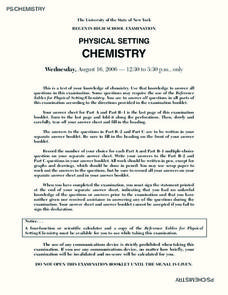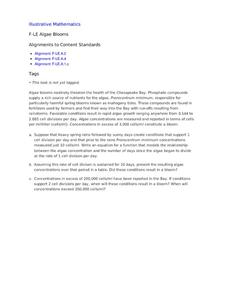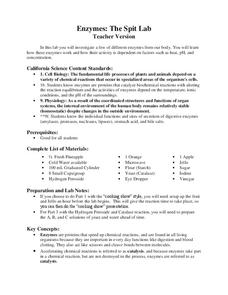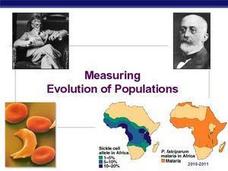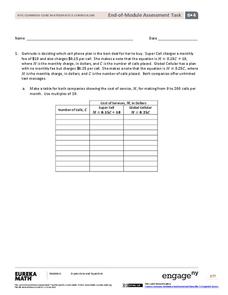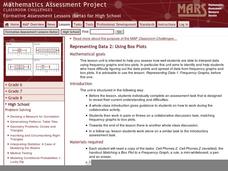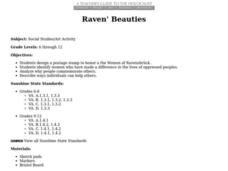Curated OER
Electrical Energy
Students compare and contrast a cell and a battery. For this physical science lesson, students explain how they create energy. They conduct an experiment to apply what they have learned in this lesson.
Curated OER
Science Spelling
In this biology worksheet, students identify and locate various vocabulary terms related to cells and parts of the body. There are 20 biology terms located in the word search.
Curated OER
Regents High School Examination PHYSICAL SETTING CHEMISTRY 2006
The 2006 version of the Regents High School Exam is just as thorough as the rest of them! Assess chemistry learners on an entire year's curriculum when they take this thirteen page test.
Baylor College
What Is a Neuron?
Your class won't get on your nerves while doing this modeling activity! After teaching the structure and function of a neuron using the included diagrams, give individuals some clay and chenille stems so that they can make their own...
Curated OER
Algae Blooms
Your microbiologists explore a changing algae population and build an exponential function modeling algae concentration from the description given of the relationship between concentrations in cells/ml and days of rapid growth.
Lake Science Collaborative
Blood Circulation Simulation
Act out the circulation of blood in the body with an innovative activity. Kids act as either body parts or blood, and carry necessary nutrients and waste throughout different stations to represent the way that oxygen circulates.
Curated OER
Anatomy of a Bone - Coloring
Clarify and color code the anatomy of a bone with this resource. This worksheet lists 7 parts of a bone along with a definition for each part. Learners read through this information and color in each part of the bone a listed color. They...
LABScI
Enzymes: The Spit Lab
Enzymes in our bodies each have a job to do. Learn the factors that affect the activity of some enzymes using the third activity of an informative 12-part biology series. A three-part laboratory activity asks teams to investigate how...
Curated OER
Measuring Evolution of Populations
The Hardy-Weinberg principle is the focus of this concise slideshow. Some vocabulary definitions are given on the first 2 slides, and the rest are given over to examples of the Hardy-Weinberg theorem. Calculations of the H-W principle...
Curated OER
Cellular Respiration: Other Metabolites and Control of Respiration
The feedback mechanisms of metabolism of a variety of substances in the human body. Carbohydrates, lipids, amino acids, and their derivatives are explained. The biochemistry required to explain the metabolic balance and feedback controls...
LABScI
Botany: The Plant Dissection Lab
Study everything about plants! The 12-part series of lessons continues with an examination of many aspects of plants. Components of the laboratory activity address the growth and structure of plants by evaluating familiar plants. The...
EngageNY
End-of-Module Assessment Task: Grade 6 Math Module 4
Finish out the module with a bang. The last installment of a 36-part module is an end-of-module assessment task. Test takers set up equations to represent relationships and solve problems in an assortment of contexts.
Curated OER
Light and Starch Production in Photosynthesis
Students are given the unique opportunity to see the contrast between parts of a leaf that have photosynthesized and parts of the leaf that have not. This visual image helps students see the results of this biological process. At the...
Curated OER
The Sorcerer's Apprentice: 200 Greatest Pop Culture Icons
Upper graders view the animated short, "The Sorcerer's Apprentice" and analyze how the music score was chosen to express the scene. They create an animation as they listen to a classical recording to experience the connection between...
Biology Junction
Protists and Fungi
It's alive, but what is it? Protists share similarities with plants, animals, and fungi without being classified as any of those three. Learn more about protists and the kingdom fungi with a short presentation. It describes the parts of...
Bully Free Systems
Bully Free Lesson Plans—12th Grade
Two sample lessons from a curriculum unit on bullying provide high school seniors with an opportunity to assess their online and cell phone behavior and to consider how they can offer support to bullied students. Each plan includes an...
Curated OER
Representing Data 1: Using Frequency Graphs
Here is a lesson plan that focuses on the use of frequency graphs to identify a range of measures and makes sense of data in a real-world context as well as constructing frequency graphs given information about the mean, median, and...
Curated OER
Representing Data 2: Using Box Plots
What information can be gleaned from a box and whiskers plot? Discuss the five summary values - minimum, maximum, upper and lower quartiles, and median - and what conclusions can be made from these values? Included here is a matching...
Charleston School District
Sketching a Piecewise Function
How do you combine linear and nonlinear functions? You piece them together! The lesson begins by analyzing given linear piecewise functions and then introduces nonlinear parts. Then the process is reversed to create graphs from given...
EngageNY
Mid-Module Assessment Task: Grade 7 Mathematics Module 5
Determine the probability that the class knows probability. The three-question assessment presents problems with finding the sample space and the probability, theoretical and experimental, of a variety of situations. Pupils also describe...
LABScI
Photosynthesis: How Do Plants Get Energy?
Examine the mechanism of photosynthesis through different light scenarios. Pupils vary the amount and type of light exposure on plant leaves in the fifth lesson plan in a 12-part series. Through observation, they determine the rate of...
Serendip
DNA
Get up close and personal with DNA! A two-part hands-on activity has learners extract DNA from a small organism and then their own cheek cells. Scholars then explore DNA replication using questions to guide their analyses.
Curated OER
Raven' Beauties
Ravensbruck was a concentration camp for women during World War II. This lesson provides background information on the camp, its effects in Prussia, and a design project intended to commemorate the women who died there. Learners make...
Other popular searches
- Animal Cell Parts
- Eukaryotic Cells Parts
- Parts of Cell Wall
- Animal Cell Parts Pictures
- Cell Function and Parts
- Animal Cell Parts Draw
- Label Animal Cell Parts
- Cell Types and Parts
- Label the Parts of a Cell
- Cells Parts
- Parts of Cello
- Eukaryote Cells Parts





